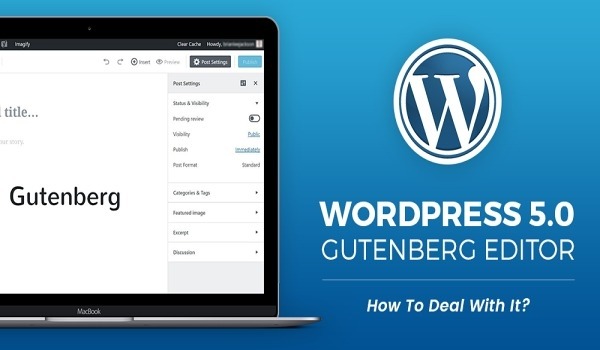
The WordPress Gutenberg editor
Gutenberg is the new default editor in WordPress (launched on 6 December 2018), replacing the word-processor-like TinyMCE. In a nutshell, it works by stacking "blocks" of various types of content on top of each other, letting a user create the kind of content they previously would have needed a custom theme or dedicated page-builder plugin to produce.

On face value, it sounds like a great improvement, but the launch of the new system has not been entirely smooth, with a considerable amount of negative feedback rolling in. Now, a couple of months after release, the big questions are: just how negative was the feedback, what caused it, and what can be done to see Gutenberg become a system users love?
Features
The response to the new Gutenberg editor isn't looking so hot from an end-user perspective. At the time of writing it's sitting at a rating of 2 out of 5 stars, from a total of 2,438 reviews. If we consider a 4 or 5 star review as favorable, a 1 or 2 star review as unfavorable, and 3 stars as neutral:
- 531 or 22% of reviewers like the plugin
- 1,818 or 75% dislike it
- 89 or 3% are neutral
In other words:
Roughly speaking, 3 out of 4 reviewers dislike Gutenberg.
It's certainly possible that those who dislike Gutenberg are more motivated to write a review, and hence the numbers may be skewed. However, an additional point of information is that the Classic Editor plugin, which switches the WordPress editor back to its previous form, has over 2 million installs. The Classic Editor plugin is not bundled with WordPress—it has to be deliberately installed. It may be possible to infer from this that around 2 million active users have, at least for now, decided against using Gutenberg.
Why is it, then, that such a high proportion of users prefer to stay away from Gutenberg in its current form?
The most common complaints, as you read through reviews, can be summarized in these points:
- Automatic rather than optional switch of editors
- Breakages in compatibility with themes and plugins, or of existing workflows
- Difficult to use, cumbersome
- Not production-ready due to usability issues or bugs
On the other hand, the most common points of praise are:
- Easy to use
- Non-developers can use it to create complex layouts
- Makes WordPress more well-equipped for the future
How different is Gutenberg editor from WordPress page builders

Gutenberg editor is the front end editor and is different from the page builders. Even though they have almost similar features, both have completely different purposes and use. The following are some of the major differences among the two.
Front end and back end editing
Gutenberg is an editor and it is designed to work on WordPress pages and posts when they are edited through the backend. Gutenberg is not a front end editor. On the other hand, WordPress page building plugins like Elementor, Divi builder or Beaver builder are all designed to work on the front end. They let you see the page you are editing as it is on the front end and you can easily edit them on the go.
Even though the Gutenberg editor lets you preview the changes, it does not let you see the changes applied real time like the WordPress page builders do. For the inexperienced designers, WordPress plugins do a great job as they are more intuitive and comparatively have better options to help you design pages.
Inbuilt feature
Gutenberg is now available as an integral part of WordPress. As it replaces the basic TinyMCE editor, the Gutenberg editor is here to provide a next level experience for bloggers and content creators.
The WordPress page builders are more useful for the designers. They can set the structure of the pages, and use different page building elements to build the pages. However, they need to be included externally. Even if your WordPress theme is a page builder based theme, it will come with a page building pre-included and
Works with any theme
The Gutenberg editor is available as an inbuilt WordPress feature which means that it will not cause compatibility issues with most themes. Newer versions of the WordPress themes are designed specifically for working with the Gutenberg editor.
However, this is not true for the page builders. If your theme doesn’t support the page builder, it might cause problems when redesigning a page. Therefore, even though the page builders can help you create new pages, and new content easily, they might not be very helpful in editing the existing content.
Page builder: More flexible
The Gutenberg editor is just an editor that you can use to create content on your website, whereas page builders let you do much more.
We can say that Gutenberg editor’s main role is to help people create interesting content with different content blocks, whereas page builders can help you design amazing layouts and pages for your website. Gutenberg editor comes with blocks mainly designed to structure your content. For example: There are blocks for including accordions or tables in your content. However, page builders can help you design pages.
Even if we ignore their basic utilities, the WordPress Gutenberg plugin has limited options as compared to the page builders. These days you get page builders with plenty of amazing options. Moreover, there are addons for these page builders to add more flexibility.
So is the new Gutenberg editor good or bad?
The new Gutenberg WordPress editor has some really useful features that will make life much easier for the end users. On the other hand, it will be hard to bid goodbye to our traditional WordPress editor, which works flawlessly. We are constantly divided between “Change is inevitable” and “If it ain’t broke, don’t fix it”.
The idea of the shared blocks, the embed blocks, and adjust-ability of blocks can really help users create content faster and more efficiently. The blocks are flexible, and the Gutenberg editor will serve as a new experience for the publishers.


